6.2 The Blood System
1/23
Earn XP
Description and Tags
Name | Mastery | Learn | Test | Matching | Spaced | Call with Kai |
|---|
No analytics yet
Send a link to your students to track their progress
24 Terms
William harvey
arteries and veins were part of a single connected blood work (through capillaries)
arteries pumped blood from the heart to the lungs and body tissues
veins pumped blood to the heart from the lungs and body tissues
artia
acts as reservoirs, by which blood returning to the heart is collected via veins
ventricles
act as pumps, expelling the blood from the heart at high pressure via arteries
left side
this side of the heart pumps oxygenated blood around the body (systematic circulation)
has a much thicker muscular wall (myocardium) as it must pump blood much further
right side
this side of the heart humps deoxygenated blood to the lungs (pulmonary circulation)
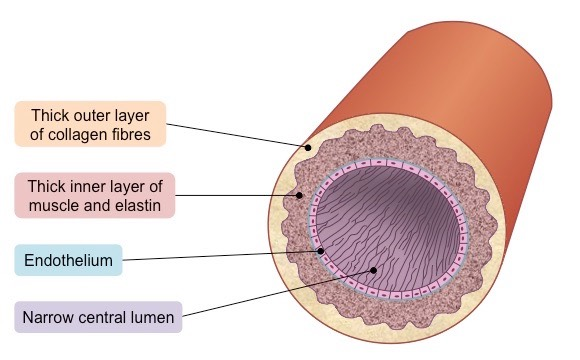
arteries
convey blood at high pressure from the heart ventricles to the tissues of the body and lungs
narrow lumen to maintain a high blood pressure
a thick wall containing an outer layer of collagen to prevent the artery from rapturing under the high pressure
the walls contain an inner layer of muscle and elastic fibers to help maintain pulse flow (contract and stretch)
muscle fibers
help to form a rigid arterial wall that is capable of withstanding the high blood pressure without rapturing
it can contract to narrow the lumen, which, increases the pressure between pumps and help to maintain blood pressure through the cardiac cycle

elastic fiber
allow the arterial wall to stretch and expand upon the flow of a pulse through the lumen
the pressure is exerted on the arterial wall is returned to the blood when th artery returns to its normal size (elastic recoil)
the elastic recoip helps push the blood forwaed through the artery as well as maintain arterial pressure between pump cycles
capillaries
exchange materials between the cells in tissue and blood travelling at low pressure (<10 mmHg)
arteries split into arterioles which in turn split into _____, decreasing arterial pressure as total vessel volume is increased
the branching of arteries into ____ therefore ensures blood is moving slowly and all cells are located near a blood supply
after material exhcange has occured, capillaries will pool into venules which will in turn collate into larger veins.
they have a very small diameter which allow passage of only a single red bloof cell at a time (optimal exchange)
it is made of a single layer of cells to minimize the diffusion distance for prmeable materials
they are surrounded by a basement membrane which is permeable to necessary materials
they man contain pores to further aid in the transport of materials between tissue fluid and blood
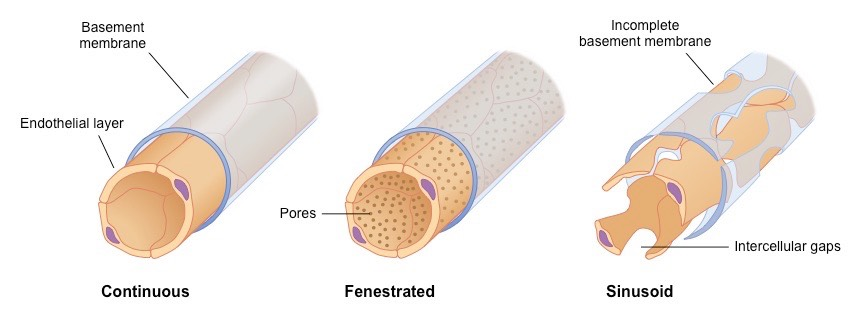
veins
collects blood from tissues and convey it at a low pressure to the atria of the heart
they have a very wide lumen to minimize blood flow for more effective return
they have a thin wall containing less muscle and elastic fibers as blood is flowing at a very low pressure
it possesses valves to prevent backflow and stop the blood from pooling at the lowest extremities
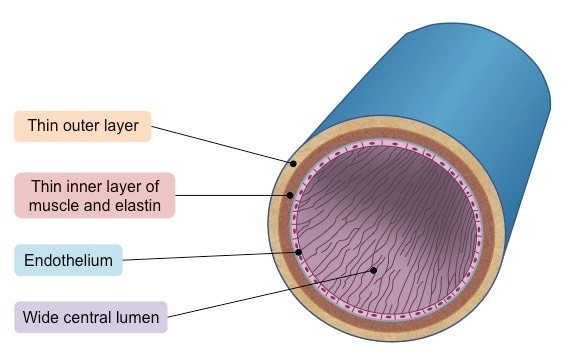
valves
because blood is flowing at a very low pressure in the veins, it makes it difficult for blood to move against the downward force of gravity, in order to maintain the circulation of the blood, ___ helps the vein my preventing backflow.
artery
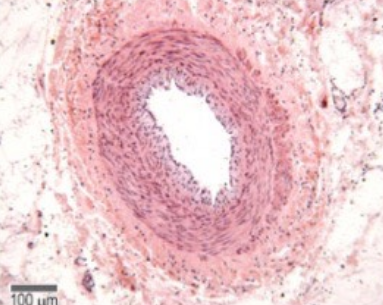
vein
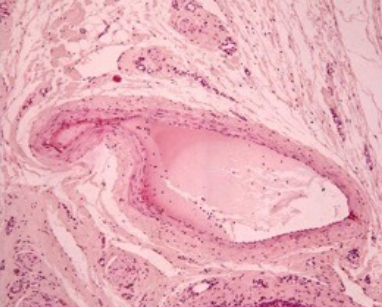
capillary
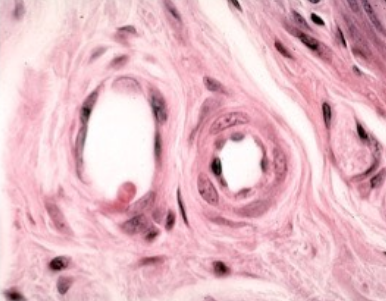
myogenic
the process of the cardiac compression arising within the heart tissue itself
the signal for a heartbeat is initiated by the heart muscles rather than from brain signals.
SA node (sinoatrial node)
located within the right atrium of the heart
it is a specialized cluster of cardiomyocytes which direct the contraction of heart muscle tissue
it acts as the primary peacemaker, controlling the rate at which the heart beats
it triggers 60-100 cardiac contractions per minute
if this fails, a secondary peacemaker (AV node) may maintain cardiac contractions roughly 40-60 bpm.
if both fail, a final tertiary peacemaker may coordinate contractions at a constant rate of roughly 30-40 bpm
the interference of the peacemakers will lead to the irregular and uncoordinated contractions of the heart muscle